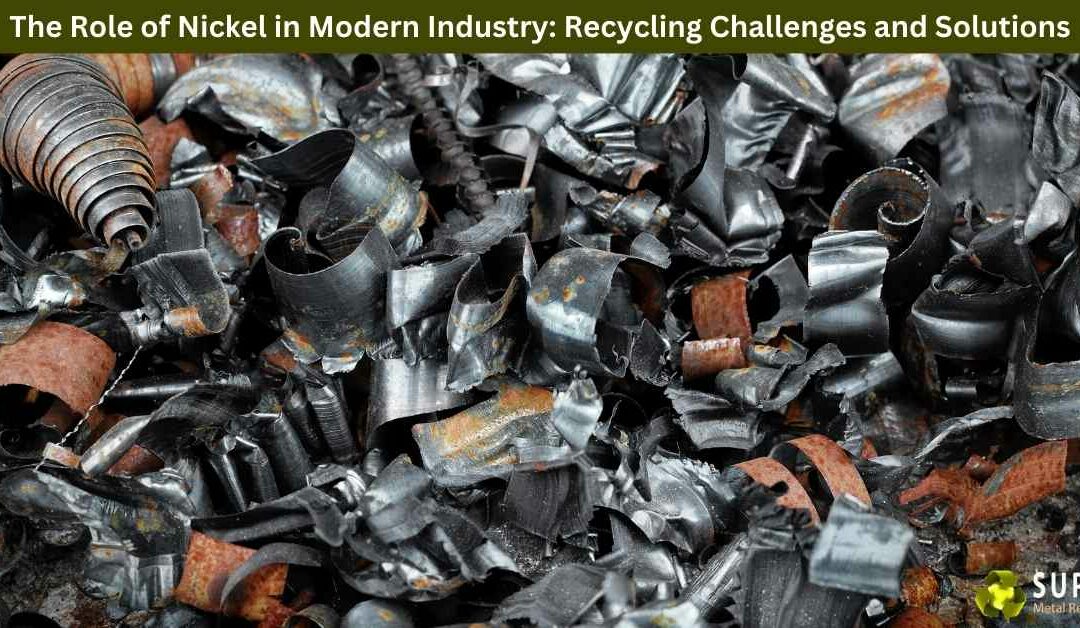Nickel is a versatile metal that plays a crucial role in various industries, including aerospace, electronics, and automotive manufacturing. Its unique properties, such as corrosion resistance and high conductivity, make it indispensable for numerous applications. However, as demand for nickel continues to rise, so do concerns about its sustainable use and disposal. In this article, we explore the role of nickel in modern industry, the challenges associated with its recycling, and innovative solutions to address these challenges.
The Significance of Nickel in Modern Industry
Nickel’s exceptional properties make it an essential component in many industrial processes and products. Some key applications of nickel include:
- Stainless Steel Production: Nickel is a primary alloying element in stainless steel, enhancing its corrosion resistance, strength, and durability. Stainless steel is widely used in construction, infrastructure, and household appliances, among other sectors.
- Electronics and Batteries: Nickel is a key component in rechargeable batteries, such as nickel-metal hydride (NiMH) and nickel-cadmium (Ni-Cd) batteries, used in portable electronic devices, electric vehicles, and renewable energy storage systems.
- Aerospace and Defense: Nickel-based alloys are prized for their high temperature and corrosion resistance, making them ideal for aerospace components, gas turbines, and military applications.
- Chemical Processing: Nickel catalysts play a crucial role in various chemical processes, including hydrogenation, petrochemical refining, and environmental remediation.
Despite its importance, nickel faces several challenges in terms of sustainability and recycling due to its complex usage patterns and the diverse range of industries it serves.
Recycling Challenges for Nickel
The recycling of nickel presents unique challenges compared to other metals, primarily due to:
- Product Diversity: Nickel is present in a wide range of products and materials, including stainless steel, electronic devices, and industrial machinery. Each of these products may require different recycling processes, posing challenges for efficient recovery and separation of nickel-containing materials.
- Contamination: Nickel recycling often faces contamination issues, as nickel-containing materials may be mixed with other metals or substances during use. Contaminants can affect the quality and properties of recycled nickel, making it challenging to meet industry standards and specifications.
- Collection and Sorting: Effective collection and sorting of nickel-containing materials are essential for successful recycling. However, the decentralized nature of nickel usage and disposal complicates the collection process, leading to inefficiencies and higher recycling costs.
- Technological Limitations: Existing recycling technologies may not be optimized for recovering nickel from complex or mixed-material products. Innovative solutions are needed to develop efficient and cost-effective recycling processes for diverse nickel-containing materials.
Solutions for Nickel Recycling
Addressing the challenges of nickel recycling requires a multi-faceted approach that combines technological innovation, industry collaboration, and policy support. Some potential solutions include:
- Advanced Separation Technologies: Invest in research and development of advanced separation technologies capable of efficiently recovering nickel from complex mixtures and contaminated materials. This may include chemical processes, electrometallurgical methods, and automated sorting technologies.
- Product Design for Recycling: Encourage product designers and manufacturers to consider recyclability and material recovery at the design stage. Designing products with standardized components and materials can facilitate easier disassembly and separation of nickel-containing parts for recycling.
- Closed-Loop Systems: Promote the adoption of closed-loop recycling systems where nickel-containing materials are collected, processed, and reused within the same industry or supply chain. Closed-loop systems minimize waste generation, conserve resources, and reduce the environmental impact of nickel production and disposal.
- Industry Collaboration: Foster collaboration between stakeholders across the nickel value chain, including producers, recyclers, consumers, and regulatory authorities. By sharing knowledge, resources, and best practices, industry players can work together to overcome recycling challenges and drive innovation in sustainable nickel management.
- Policy Support and Incentives: Implement policies and incentives to support nickel recycling efforts, such as extended producer responsibility (EPR) programs, tax incentives for recyclers, and mandatory recycling targets. Government support can help create a favorable environment for investment in recycling infrastructure and technology development.
Nickel plays a critical role in modern industry, powering innovation and driving economic growth. However, its sustainable use and disposal pose significant challenges that require collaborative efforts and innovative solutions. By addressing the complexities of nickel recycling through advanced technologies, product design improvements, industry collaboration, and supportive policies, we can unlock the full potential of nickel as a sustainable resource and minimize its environmental impact for future generations.
If you are in Mentone, Victoria 3194, and looking for a metal recycling service, this is the best way to visit us.
Super Metal Recycling
345 Frankston – Dandenong Road, Dandenong South VIC 3175
(03) 9706 4909


Recent Comments